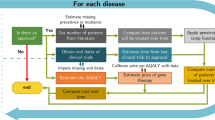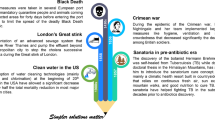Abstract
'Personalized medicine' promises to increase the quality of clinical care and, in some cases, decrease health-care costs. Despite this, only a handful of diagnostic tests have made it to market, with mixed success. Historically, the challenges in this field were scientific. However, as discussed in this article, with the maturation of the '-omics' sciences, it now seems that the major barriers are increasingly related to economics. Overcoming the poor microeconomic alignment of incentives among key stakeholders is therefore crucial to catalysing the further development and adoption of personalized medicine, and we propose several actions that could help achieve this goal.
This is a preview of subscription content, access via your institution
Access options
Subscribe to this journal
Receive 12 print issues and online access
$209.00 per year
only $17.42 per issue
Buy this article
- Purchase on Springer Link
- Instant access to full article PDF
Prices may be subject to local taxes which are calculated during checkout





Similar content being viewed by others
References
Iakoubova, O. A. et al. Association of the Trp719Arg polymorphism in kinesin-like protein 6 with myocardial infarction and coronary heart disease in 2 prospective trials. J. Am. Coll. Card. 51, 435–443 (2008).
Shiffman, D. A. et al. Kinesin family member 6 variant is associated with coronary heart disease in the women's health study. J. Am. Coll. Card. 51, 444–448 (2008).
Iakoubova, O. A. et al. Polymorphism in KIF6 gene and benefit from statins after acute coronary syndromes. J. Am. Coll. Card. 51, 449–455 (2008).
Zafar, I., Levy, T. & Damergy, S. Third Wave Technologies Report, Hospital Supplies and Medical Devices. (Deutsche Bank, 12 May, 2008).
Davies, L. & Welch, H. G. Increasing incidence of thyroid cancer in the United States, 1973–2002. JAMA 295, 2164–2167 (2006).
Goodman, C. et al. The Value of Diagnostics, Innovation, Adoption and Diffusion into Health Care. The Southern California Biomedical Council [online], (2005).
Author information
Authors and Affiliations
Corresponding author
Supplementary information
Supplementary information S1 (Box)
Methods and additional detail Interviews conducted (PDF 367 kb)
Supplementary information S2 (Figure)
(PDF 375 kb)
Related links
Rights and permissions
About this article
Cite this article
Davis, J., Furstenthal, L., Desai, A. et al. The microeconomics of personalized medicine: today's challenge and tomorrow's promise. Nat Rev Drug Discov 8, 279–286 (2009). https://doi.org/10.1038/nrd2825
Published:
Issue Date:
DOI: https://doi.org/10.1038/nrd2825
This article is cited by
-
Intratumor graph neural network recovers hidden prognostic value of multi-biomarker spatial heterogeneity
Nature Communications (2022)
-
Fused Raman spectroscopic analysis of blood and saliva delivers high accuracy for head and neck cancer diagnostics
Scientific Reports (2022)
-
Integrating molecular, histopathological, neuroimaging and clinical neuroscience data with NeuroPM-box
Communications Biology (2021)
-
Value-Based Pricing Alternatives for Personalised Drugs: Implications of Asymmetric Information and Competition
Applied Health Economics and Health Policy (2020)
-
Current landscape of personalized medicine adoption and implementation in Southeast Asia
BMC Medical Genomics (2018)



